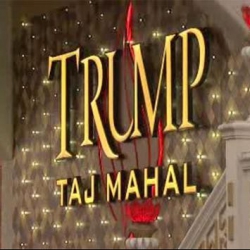Carl Icahn told the Associated Press on Monday that he plans to sell the Trump Taj Mahal, which the New York City billionaire closed on October 10. While discussing the upcoming sale of his shuttered casino, Carl Icahn once again blamed others for the casino’s closure.
In his interview with AP reporter Wayne Parry, Mr. Icahn said, “After Sweeney’s irresponsible actions, I have made a decision to sell the Taj if I can, but not to invest the $100 million to $200 million in it that I was going to. I’m done with it.”
Local 54’s Casino Strike
When he closed the casino, Carl Icahn blamed Local 54 of the UNITE-Here workers union. The union represented roughly 1,000 of the Trump Taj Mahal’s 3,000 workers. The Local 54 went on strike over the Fourth of July weekend, in order to regain their health and pension benefits which Trump Entertainment Resorts had won the right to eliminate in an October 2014 court battle.
After the strike continued for several weeks, Icahn said he would shut the casino down on October 10, 2016. Carl Icahn put the blame for the closure on Local 54’s leader, Bob McDevitt, whom he said negotiated in bad faith. For his part, Bob McDevitt said much the same about Carl Icahn.
Stephen Sweeney’s Anti-Icahn Bill
New Jersey state legislators suspected Carl Icahn had shuttered the Trump Taj Mahal with the intent of reopening under a new name at a later time. With a new brand, the casino would reopen with non-union workers, thus circumventing the labor laws of New Jersey.
To avoid that possibility, New Jersey Senate President Stephen Sweeney championed a bill which would make have forced a casino operator to give up their casino license for 5 years, if they closed their casino and reopened it. To twist the knife, the bill was made retroactive to January 2016, so the Trump Taj Mahal was covered by the new law.
Gov. Christie’s Veto of the Bill
Gov. Chris Christie vetoed Sweeney’s bill, saying that the bill represented the worst instincts of lawmakers. Christie’s veto message said, “This bill represents the Legislature at its worst. It is a transparent attempt to punish the owner of the Taj Mahal casino for making the business decision to close its doors after its union employees went on strike and refused to negotiate in good faith.”
Despite the veto, Carl Icahn has decided to sell the Trump Taj Mahal, blaming Stephen Sweeney. Presumably, the casino mogul does not want to operate under a proverbial Sword of Damocles. Chris Christie’s term as governor ends in 2018 and a Democrat likely will replace him in that position, as New Jersey is a liberal-leaning state and Gov. Christie’s administration has been quite unpopular in recent years.
Icahn: Sweeney Has Done “Irreversible Damage” to Atlantic City
During his interview with the Associated Press, Carl Icahn heaped particular abuse on Sweeney, claiming the senate president had made it much less likely for outside investors to want to invest in the Atlantic City casino industry.
Icahn said, “Unfortunately, as far as I’m concerned, Sweeney has already done irreversible damage to Atlantic City in particular and New Jersey in general.”
Icahn described Stephen Sweeney as the worst kind of politician, claiming that the longtime politician did not have the requisite skills to lead at the state level. Icahn added, “The combination of inexperience and power in a government leader is extremely dangerous and often fatal. Sweeney is the greatest proof of that.”
Carl Icahn’s Plans
One thing Carl Icahn’s actions after the Sweeney bill indicate is the Democratic senate president’s instincts might have been right. If Carl Icahn did not plan to reopen the Trump Taj Mahal without casino workers, then he would have no reason to be concerned about the new law.
The billionaire did not mention in his interview a potential buyer. There appears to be no potential buyer at the moment. Icahn filed for a deed restriction in December 2016 which would keep the Trump Taj Mahal from being reopened as a casino, presumably for tax purposes. As the owner of the deed restriction, Icahn would be able to tear up the restriction, if he sold to a new buyer.

